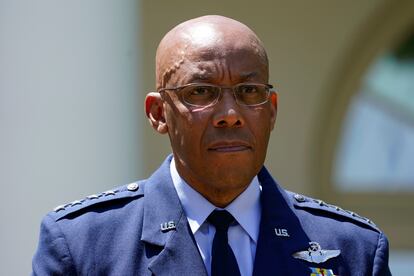The United States and China resume military dialogue after a 16-month hiatus in communications
The video call between the two powers’ generals comes a month after the meeting in which Biden and Xi agreed to resume their relationship


On Thursday, a video call served to restore some normalcy to the strained relations between China and the United States. The call took place between U.S. Chairman of the Joint Chiefs of Staff Air Force Gen. CQ Brown Jr. and Liu Zhenli, People’s Liberation Army (PLA) general and chairman of China’s Central Military Commission. That conversation between the two high-ranking officers ended a 16-month hiatus in military communications between the two powers. Beijing suspended contact between the two countries in August 2022 in response to then-Speaker of the House of Representatives Nancy Pelosi’s visit to Taiwan.
According to the Pentagon, the two generals discussed “security matters of global and regional interest,” although it did not go into detail about the substance of the conversation. A brief press release following the call, which took place at 6:30 Washington time, said only that “Gen. Brown discussed the importance of working together to responsibly manage competition, avoid miscalculations, and maintain open and direct lines of communication.” The statement added that “Gen. Brown reiterated the importance of the People’s Liberation Army engaging in substantive dialogue to reduce the likelihood of misunderstandings.”
The return to dialogue comes a month after the annual summit of the Asia-Pacific Economic Cooperation (APEC) summit in San Francisco in November, which included a bilateral meeting between the presidents of the United States, Joe Biden, and China, Xi Jing Ping.
The agreement to resume contact came after four hours of meetings in a mansion on the outskirts of San Francisco. There, Xi and Biden agreed not only to resume military dialogue but also to cooperate in combatting the fentanyl crisis and to keep the lines of contact open to prevent the rivalry between the two superpowers from “drifting into confrontation.” According to Biden, the thorny issue of Taiwan was addressed in a “frank” manner, but it was left out of the renewed willingness to reach an understanding.
Biden’s arrival at the White House seemed poised to usher in a new era in relations between the two powers. Their relationship had been frayed since 2018, when then-President Donald Trump’s administration and Beijing imposed tariffs on tens of billions of dollars of goods from their respective countries.
Last February, the Chinese balloon crossing the United States in a flyover that was live-streamed almost to the minute marked one of the low points in the battered diplomatic relations between the two countries. The San Francisco meeting and Thursday’s video call are attempts to restore good will to the most influential bilateral agenda in the global arena.
A politician of Pelosi’s rank had not visited Taiwan since 1997, when then-Speaker of the House of Representatives Newt Gingrich did. China interpreted Pelosi’s visit as a provocation and increased its military maneuvers in the area. It fired missiles over Taiwan and, defiantly, into Japan’s exclusive economic zone.
The Pentagon has also reported an increase in “dangerous” incidents involving Chinese aircraft and warships. Last October, the Defense Department released video footage of some of the more than 180 Chinese aircraft interceptions of U.S. fighter jets over the past two years, more than the total number in the previous decade.
Sign up for our weekly newsletter to get more English-language news coverage from EL PAÍS USA Edition
Tu suscripción se está usando en otro dispositivo
¿Quieres añadir otro usuario a tu suscripción?
Si continúas leyendo en este dispositivo, no se podrá leer en el otro.
FlechaTu suscripción se está usando en otro dispositivo y solo puedes acceder a EL PAÍS desde un dispositivo a la vez.
Si quieres compartir tu cuenta, cambia tu suscripción a la modalidad Premium, así podrás añadir otro usuario. Cada uno accederá con su propia cuenta de email, lo que os permitirá personalizar vuestra experiencia en EL PAÍS.
¿Tienes una suscripción de empresa? Accede aquí para contratar más cuentas.
En el caso de no saber quién está usando tu cuenta, te recomendamos cambiar tu contraseña aquí.
Si decides continuar compartiendo tu cuenta, este mensaje se mostrará en tu dispositivo y en el de la otra persona que está usando tu cuenta de forma indefinida, afectando a tu experiencia de lectura. Puedes consultar aquí los términos y condiciones de la suscripción digital.








































